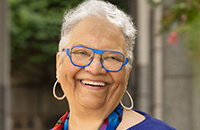
As you read this column, we know that Donald Trump will be the next president of the United States. For an organization that strongly endorsed Kamala Harris, her principles and her vision for the future of America, we are saddened by the election’s outcome. The vulnerable clients we serve are still here—and may need us now more than ever.
As I reflect on my time as a social worker, I have witnessed many changes in this country—including its increasing tolerance for turning a blind eye to the lack of social protection systems that help sustain communities and protect children and families.
I have been a social worker for more than 40 years and have been a participant observer in the profession’s evolution. I live in Alaska, one of the last states to pass social work licensure, but one that includes title protection. I had the opportunity to provide training to tribes following the passage of the Indian Child Welfare Act (ICWA) in 1978 and to make tribes aware of their responsibility and authority to intervene in the protection of Native American and Alaska Native children. In a major ruling in 2023, the U.S. Supreme Court rejected a challenge to the constitutionality of ICWA. This was a major victory for Indian sovereignty.
There have been some successes, but barriers still exist. Financial insecurity, lack of access to appropriate health care, substandard housing, lack of educational opportunities, and crime-ridden neighborhoods pose significant barriers to positive outcomes and to sustainable, stable and resilient communities. Social protection can improve the quality of life for vulnerable populations, but some individuals in policy positions view social protection as a model for dependency rather than resiliency.
Social protection systems can contribute to creating social justice by reducing poverty (36.8 million people in poverty in the U.S. in 2023) and eliminating inequalities, all while creating the base for sustainable economic development. The World Social Protection Report, adopted at the International Federation of Social Workers’ general meeting in 2016 in Seoul, South Korea, addressed social workers’ importance in advocating for transformational social protection systems “built from the real needs of all people and the realization of all people’s rights.” Social workers have to mediate between state systems and community systems to achieve outcomes that reinforce sustainable communities.
We know that the next four years will be a struggle for our profession, but this is not a time for defeat—that word is not in our vocabulary. This is not the time to rest or to “wait and see” what the political changes will be. Social work has its roots in the Industrial Revolution. We were there then and we are here now, continuing to forge ahead. It is time to work with our partners around the globe to build a powerful voice for social change. We should take a lesson from the story of David and Goliath: No matter how big the obstacle, it can be overcome.
“Change will not come if we wait for some other time. We are the ones we’ve been waiting for.
We are the change that we seek.”
— Barack Obama
Contact Yvonne Chase atpresident@socialworkers.org